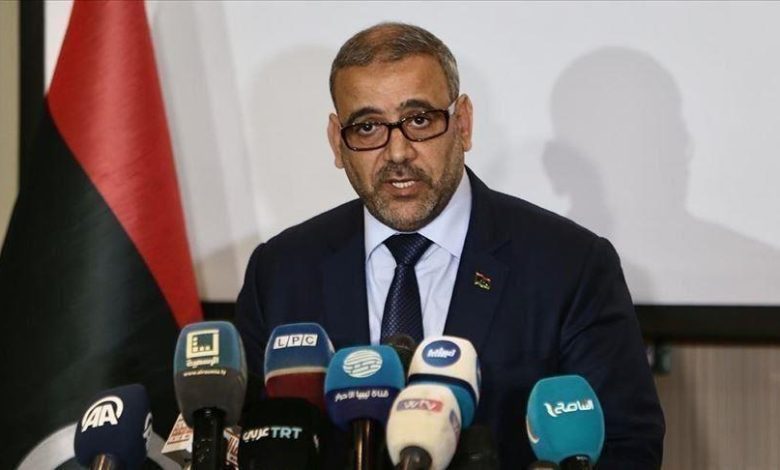Al-Mishri reveals the shape of Libya’s executive and legislative branches

The President of the Libyan High Council of State, Khalid Al-Mishri, revealed, at dawn on Monday, the features of the future system of government in Libya, according to the constitutional document agreed with the President of the Libyan Parliament, Aguila Saleh, in Cairo, noting that it includes legislative authority from two chambers, namely the House of Representatives based in Benghazi and the Senate based in Tripoli, with the aim of creating a political balance in the country.
Saleh and al-Mishri issued a joint statement last Thursday saying they are committed to “completing a consensual constitutional foundation for reaching the presidential and parliamentary elections.” The statement said they “agreed to refer the completed constitutional document to the Constitutional Process Committee for approval according to the rules of each council,” without providing details.
In an interview with Libya al-Ahrar television, the media arm of the Muslim Brotherhood in Libya, Khalid al-Mishri said the document stipulates that the new House of Representatives will be elected through an individual system and a list, while the upper house will be elected through an individual system.
It was agreed that there should be a constitutional document, not a constitutional rule, he said, noting that it should include 67 articles, not 180, as was the case on social networking sites.
The document also stipulates that each candidate in the Senate elections must obtain more than 50 percent plus one of the votes, according to the candidate.
Observers believe that the establishment of the two-chamber system for the legislative council in the country, although it is applicable in many parliaments in the world, but the geographical division of the parliamentary chambers suggests two things. The first is that the political division in the country has become a reality, and the second is that the two men are Yemenis who wish to remain in their positions at the same headquarters in Tripoli and Benghazi, while the legislative nature was given to the High Council of State, which is in fact an advisory body formed in accordance with the Skhirat Agreement. It is composed of the remnants of the outgoing conference that supported the agreement and represented the majority of the Muslim Brotherhood.
Al-Mishri addressed the conditions of his candidacy that were agreed upon in the constitutional document with parliament. He said that any military person or other official would have to resign before running for president, and that a court ruling – even if it is not final – would not have been issued against the candidate.
All articles in the document are subject to agreement, and the dispute is still ongoing regarding only one article related to dual nationality, he said, noting that it was stipulated that disputed articles in the constitutional document be voted on upon if they were not approved, because the people are the source of authority.
Political circles believe that the points of contention affect all the controversial figures who are leading the political scene and were the cause of the failure of the last elections, as well as the military forces that control the land.
The same circles consider that accepting Khalid Al-Mishri’s conditions not to run against the military will exclude the Libyan Army Commander Field Marshal Khalifa Haftar from running. This is rejected by the latter, who had previously demanded on the anniversary of independence to draw a roadmap for the holding of the postponed presidential and parliamentary elections, and described the current political components as “clinically dead”, and called on the United Nations Mission to take responsibility for finding a solution to the Libyan crisis.
These circles point to the refusal of dual nationals to run as political isolation for most opponents of Libya’s former regime who have acquired a second nationality while living in diaspora countries, which would disrupt regional and United Nations efforts and initiatives to resume the electoral process in Libya.
Al-Mishri, however, tried to distance himself from disrupting the electoral process, accusing in the TV interview that the head of the national unity government, Abdul Hamid Dbeibeh, would fight to prevent any step leading Libyans to elections and would spend billions for them.
Al-Mishri, in an interview on Libya Al-Ahrar channel, which is funded by Qatar and broadcasted from Turkey, called on the female doctor to hold a debate on live public, open-ended topics. He said that if elections cannot be held under two governments, a new authority would be formed with the goal of holding elections.
Observers point out that this rejection will certainly not be accepted by Dbeibeh and a part of the international community, foremost among them the United States, which has already expressed its rejection of the formation of a new government and confirmed its support for the option of the continuation of the Tripoli government until elections are held.
Since March 2022, a government led by Fathi Bashagha has been struggling for power and has been tasked by the House of Representatives in Tobruk (east), headed by Saleh, with the Dbeibeh government, which refuses to hand over power except to a government mandated by a new elected parliament.
To resolve the crisis, the United Nations has initiated an initiative to form a parliamentary and state parliamentary committee to agree on a constitutional basis that will lead the country to elections that were stalled in late 2021.












